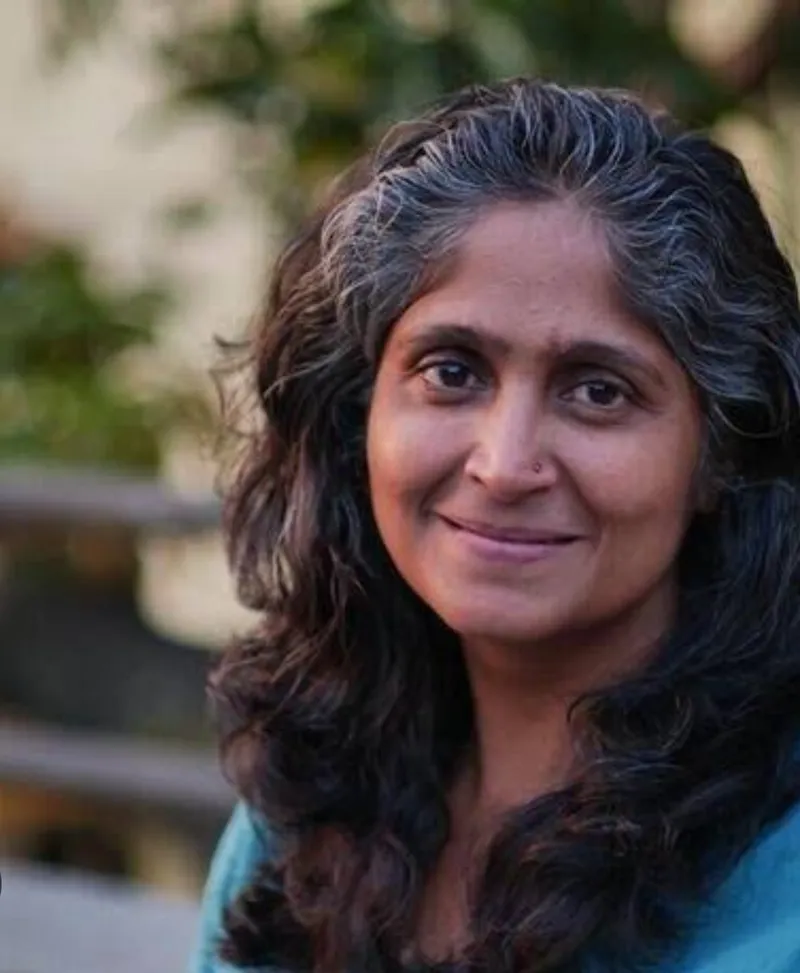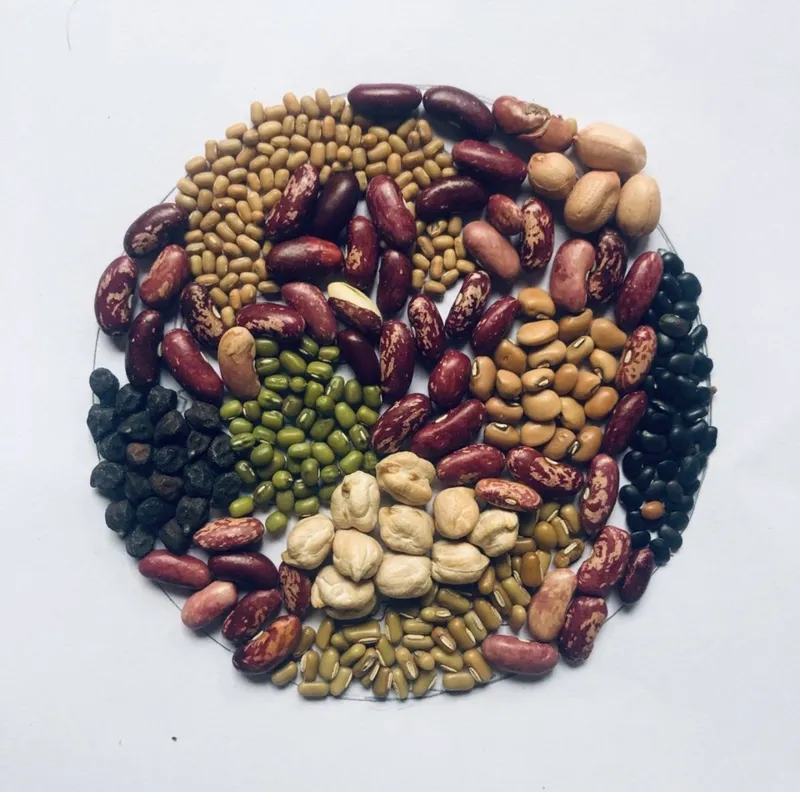This CA-turned farming enthusiast is getting organic farmers their due
Buffalo Back is a farming collective in Bengaluru that bridges urban needs with traditional rural knowledge, aiming to benefit farmers, consumers, and the environment all at once.
Visalakshi Padmanabhan chose to study botany and zoology in college as she dreamt of buying a piece of land in a forest, building a home on it, and spending the rest of her life there. Her final year internship, or “volunteering” as it was called then (in the 1990s), was at a zoo in Bengaluru, where she looked after wild cats that were separated from their mothers.
“I loved it, and could be doing that forever,” Padmanabhan tells Social Story.
However, life had different plans and she became a Chartered Accountant (CA) in order to earn for her family, so that they could live in the wilderness and grow their own food.
Padmanabhan married a professor who came from a second-generation farming family. So, the couple’s plan was set early on in their marriage--they aimed to purchase a piece of land near Bannerghatta Forest in Bengaluru, settle there, pursue agriculture, and homeschool their kids. To achieve this dream, they were willing to do whatever was necessary, including earning money in the city to fund this life.
Today, Padmanabhan runs Buffalo Back Collective, a network of small-holding organic farmers around Bengaluru. It is a social enterprise seeking to change the relationship between urban consumers and their food, and striving to evolve a healthier food system.
How it began?
Padmanabhan started Buffalo Back Collective in 2013 as a quest to bring healthy, nutritious, and organically-grown food to the table for her family.

Visalakshi Padmanabhan, Founder, Buffalo Back Collective
“Since my husband also came from a farming background, I, along with a few young mothers in Bengaluru formed a group and procured farm-fresh, organic food for our children,” she says.
The journey began a few years earlier in 2009 when they started travelling to meet farmers from whom they could source the produce directly.
“We wanted to create a trust-based system where resources were pooled. It was quite an impulsive thought, to bring all the goodness together,” says Padmanabhan.
Initially, the collective started as a weekend market in Malleswaram in Bengaluru where they started selling fruits and vegetables in peri urban places of the city. The team also became associated with a seed bank to source heirloom seed varieties of native vegetables, fruits, herbs, flowers, spices, and cereals. With contributions from friends and volunteers who offered space and time, the market quickly gained traction.
Padmanabhan ensured the produce was sourced directly from farmers, Farmer Producer Organisations, (FPOs), and small and marginal farmers only.
“We didn’t think about growth, about what would happen if we scaled, or how we would administer it. It was just optimism,” recalls Padmanabhan.
Their emphasis on transparency also set them apart. “We would publish the names and phone numbers of the farmers on a board that was displayed at the store. Later, we began doing it through our WhatsApp groups, where we wrote a little brief about the farmer and where they came from," she says.
Over time, it expanded to nine markets across Bengaluru.
The need for a collective
As Padmanabhan got more involved with farming communities, local markets, and agricultural regulations, they discovered the complex challenges faced by farmers.
She was introduced to the politics of food security and the challenges faced by small farmers in navigating markets and policies. Her engagement with seed politics, genetically modified crops (GMC), and organic food regulations deepened her understanding of the food system's complexities.
“We had to organise ourselves, add administrative functions, and set it up like a business,” she says.
Since then, Buffalo Back became not just a marketplace, but a critical player in the organic food movement, focusing on creating sustainable solutions for small and marginal farmers, including having price points decided by them and creating a consistent, predictable market.
“Our core values were around building transparency and trust-based relationships between our farmers and consumers. We want to see the market, not necessarily us, scaling,” she says.
“We work to sensitise people towards organic food and encourage them to buy more of it as a lifestyle choice. This opens the doors for our farmers to sell bigger too,” she adds.
Working with policymakers
This journey also took Padmanabhan into activism and policy work, particularly through her involvement with organisations like the PGS Organic Council, which promotes small-scale organic farming and advocates for alternative certification systems like the Participatory Guarantee System (PGS).
After studying and understanding the development perspective from NGOs, and Padmanabhan is now heading a coalition of NGOs called PGS Organic Council.
Her work, which includes social audits and engaging with the agriculture ministry, aims to create better policies for organic farming at both the state and national levels.
This also led Padmanabhan to understand the systemic barriers that prevents organic farming from scaling--from bureaucratic hurdles to access to resources.
Post-COVID shift and the CSA model
The COVID-19 pandemic forced the collective to rethink its model. “We became more focused on promoting Community-Supported Agriculture (CSA) formats, especially for fresh produce,” she says.

Among the food varieties Buffalo Back Collective promotes are heirloom pulses and cereals native to the region.
CSA is a crop sharing system that connects the producer and consumers within the food system more closely by allowing the consumer to subscribe to the harvest of a certain farm or group of farms. This is now at the core of their approach, directly connecting consumers with women farmers. While Padmanabhan says they work with all farmers, for their CSA programme, they particularly focused on women farmers to easily plug developmental initiatives offered by the government and water-related initiatives offered by the gram panchayat for them.
“We focus on peri-urban villages so that the produce can reach homes fresh, and we prefer working with groups of women,” says Padmanabhan. This model emphasises on sustainability, ticking all the boxes: livelihood, soil health, women’s empowerment, and high-quality organic produce.
Buffalo Back is awaiting a small grant from Keystone Foundation, and is exploring ways in which the community itself can pool in resources.
“We don’t rely so much on grant capital because we are not doing this work from an intervention standpoint. We focus on mobilising resources communities already have. In case communities don’t have resources, we have these partnerships with social investors and impact investors, who make sure that we get the capital on time,” says Padmanabhan.
Today, 25 women farmers and 60 families have signed up for the CSA model, along with cafes and schools in Bengaluru. Padmanabhan says they have been working to enable long-term commitment from consumers.
“We no longer encourage the supply chain format. We are asking people to be subscribers and stay committed for quite some time, because that’s when it works for farmers.”
For women farmers, the Buffalo Back Collective facilitates access to land and resources, and also provides training if needed. “But the mode is not intervention, it’s facilitation,” Padmanabhan clarifies.
In addition to the CSA work, the collective’s advocacy continues at the national level, particularly through the PGS Organic Council. “We center everything around the certification system, the PGS system,” she says.
The collective's work now spans across India, including climate-critical regions like the Himalayas, where they focus on sustainable agriculture practices tailored to local needs.
Edited by Megha Reddy






